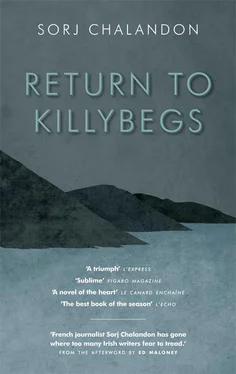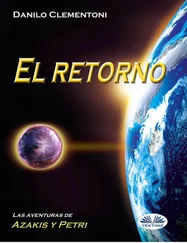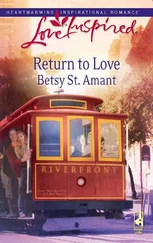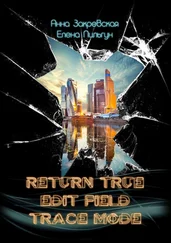— Do you know how many anti-aircraft guns we have here, do you? shouted the man.
He was waiting for a response, but most people continued on their way, ashamed to lend him an ear.
— Twenty-odd in the whole of Ulster! And anti-aircraft shelters? Four! Only four, counting the public toilets on Victoria Street! And spotlights? How many? Eh? How many beams for tracking the planes? A dozen! There were over two hundred bombers last night, Fritz’s best, eh? Junkers! Dorniers! And as for us, what did we have?
— Damned papist! a guy passing yelled without turning.
The speaker shook his fist at him.
— Imbecile! I’m a loyal Protestant! British like you! A member of Coleraine’s Orange Order, so spare me your lecture!
And then he got down from his breeze block. He pulled up the collar of his jacket and put his limp hat back on while muttering once more:
— Imbecile!
A Protestant. It was the first time in my life I’d seen one.
3. Killybegs, Sunday, 24 December 2006
I have often come back to Killybegs, to my father’s house. Even now there is still no electricity or running water. I left the cottage as it was. In memory of my mother, crouched before the fireplace, rekindling the embers, hands cupped around her lips, and of my father, sitting at the table, fists under his chin, waiting for the rain to stop.

My wife Sheila never liked coming here with me. She used to say that the house was a tomb. That Padraig Meehan’s evil shadow flickered across my face when I was under his roof. My brothers and sisters never came back. United States, England, Australia, New Zealand. Apart from baby Sara, they all opted for exile. So I kept the key. I alone. I kept it as though protecting some scrap of memory. Since the Sixties it’s here I have always come to take refuge. To escape Belfast, the city, the fear, the British. To cross the border, find the Ireland that still belongs to our flag. I come from time to time, for a few days or a few weeks, to draw the water from the well, to shiver in front of the black hearth. To walk in the forest and gather the armful of wood for the night. To be startled by nothing but the crackling of the fire. I put a new coat of whitewash on the thick walls. I repaired the slate roof. I chopped down the old diseased elm tree, but kept the huge fir. Over all these years, with nothing to hurry me, fearing nobody, I came here on retreat. A hermit, a monk from our monasteries, a recluse.

I have often come back to my father’s house, but when I arrived here four days ago, I came to die. Without my wife, without my son. Alone, off a bus from Dublin. Sheila joined me two days later, for an hour. She brought me supplies, beer, vodka, Seánie’s hurley, and then she left again to go back to Belfast. I didn’t want her to stay. Too dangerous. Jack should be coming to see me in early January.
On the kitchen wall I drew a rough calendar in black pencil, similar to the ones we used to make in prison so as not to lose track of time: 24 December 2006. One stroke per day and a cross through each week. For the first three days I managed to stay inside. The cottage had become my den. I barricaded the door from the inside, blocking the handle with a plank. Sheila had sewn me some dark curtains. At night, I drew them carefully before lighting my candles.
My wife and son had begged me to avoid Mullin’s. They feared for my life. They were right, no doubt. After three days shut away in my father’s house, though, I gave up hiding.
That morning, I walked into the village to buy a notebook and some pens. I have the urge to write. Not to confess, and certainly not to offer explanations, but to recount, to leave a trace. Then I walked along the harbour, the bog, along the edge of the wintery forest. I was just an old man, cap down over my eyes and wearing a jacket that has seen better days. Nobody would recognize me as Meehan the traitor. Not even that bastard Timmy Gormley, who had never budged from the street he grew up on, and who would surely die one day crossing it with shuffling footsteps.
I called Sheila on my mobile phone.
— Someone will recognize you. Go back to the cottage, my wife begged.
She wanted to live with me here, in spite of everything. But I refused. Too risky. Belfast had become stifling for her, so she had gone to Strabane to stay with a friend.
— They’ll come, she whispered.
Of course, they will come. They had already come, for that matter. When I arrived here, I cleaned off the word ‘Traitor!’ that was smeared in black tar over the whitewashed wall. But what am I meant to do? Wait in Belfast, or here, behind the curtains of the house or in front of my pint in the pub, what difference will it make? They will come, I know that.
I had decided. Every evening, I’ll walk through the door of Mullin’s, drink the Guinness my father drank, sit at his round table against the wall, between the dartboard and the jacks. My father’s window, his doorway, his drunken front steps. Today, even my first pint was for him. I drank it with my eyes closed. And then I looked around the pub. Everything had changed; nothing had changed. It was smaller than in my schoolboy’s memory. The smells had lost their intensity. Posters had replaced the framed drawings on the walls. The voices were softer, the laughter absent. But on the floor, close to the table, you could see the mark from the old stove that used to be crammed with turf. The wooden floor still bore the scuffs of old footfalls, spilled drinks, cigarette burns. Shards of our past were everywhere.
I felt good. I took the sliotar out of my pocket, the hurling ball Tom Williams had given me sixty years previously. When he threw it to me one night in the middle of the street it was white, almost new. He had used it once, in a friendly match against an Armagh team. The captain from the opposing team was fifteen years old. He and his lads had hammered Belfast. As a tribute to the losing team they had signed the sliotar and given it to Tom as a gift. Today the names were worn away. The ball was the colour of slate after rain. The leather was flaking and the seams were split, like the wrinkled skin of an old man. Inside, the cork was black and hard as a peat briquette. It wasn’t even round any more, or smooth, or even a ball at that. A burst prune. The talisman of a condemned man.
I placed the notebook on the round table. It was a schoolchild’s copybook with an emerald-green cover. I stroked it with the flat of my hand for a long time before even opening it. I hesitated. I wanted to write ‘Tyrone Meehan’s Journal’ on the cover, but that sounded too pretentious. ‘Confessions’ didn’t have the right ring to my ear, either. Nor ‘Revelations’. So I wrote nothing at all on the front. I opened the copybook, pressing the central fold flat with my fist.
On my sixth pint, I wrote a few words on the first page:
Now that everything is out in the open, they will all speak in my place — the IRA, the British, my family, my close friends, journalists I’ve never even met. Some of them will go so far as to explain how and why I ended up a traitor. It incenses me that books may well be written about me. Do not listen to any of their claims. Do not trust my enemies, and even less my friends. Ignore those who will say they knew me. Nobody has ever walked in my shoes, nobody. The only reason I am speaking out now is because I am the only one who can tell the truth. Because after I’m gone, I hope for silence.
I dated it: Killybegs, 24 December 2006 . I signed my name and then I left to go home.
Читать дальше













